Related Research Articles

Nicolaus von Amsdorf was a German Lutheran theologian and an early Protestant reformer. As bishop of Naumburg (1542–1546), he became the first Lutheran bishop in the Holy Roman Empire.
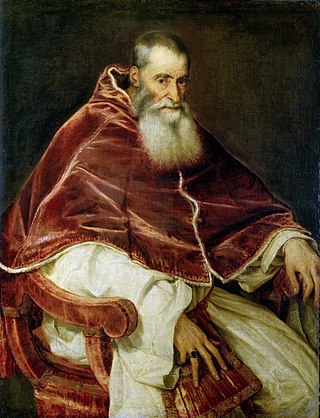
Pope Paul III, born Alessandro Farnese, was head of the Catholic Church and ruler of the Papal States from 13 October 1534 to his death, in November 1549.

Christian III reigned as King of Denmark from 1534 and King of Norway from 1537 until his death in 1559. During his reign, Christian formed close ties between the church and the crown. He established Lutheranism as the state religion within his realms as part of the Protestant Reformation, and was the first King of Denmark-Norway.
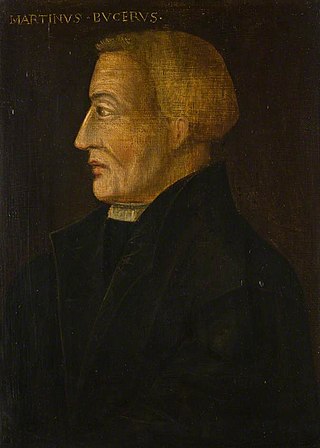
Martin Bucer was a German Protestant reformer based in Strasbourg who influenced Lutheran, Calvinist, and Anglican doctrines and practices. Bucer was originally a member of the Dominican Order, but after meeting and being influenced by Martin Luther in 1518 he arranged for his monastic vows to be annulled. He then began to work for the Reformation, with the support of Franz von Sickingen.
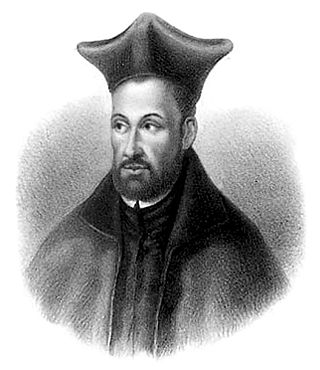
Peter Faber, SJ was a Jesuit priest and theologian, who was also a co-founder of the Society of Jesus, along with Ignatius of Loyola and Francis Xavier. Pope Francis announced his canonization in 2013.

Hermann of Wied was the Archbishop-Elector of Cologne from 1515 to 1546.

Frederick III of Simmern, the Pious, Elector Palatine of the Rhine was a ruler from the house of Wittelsbach, branch Palatinate-Simmern-Sponheim. He was a son of John II of Simmern and inherited the Palatinate from the childless Elector Otto-Henry, Elector Palatine (Ottheinrich) in 1559. He was a devout convert to Calvinism, and made the Reformed confession the official religion of his domain by overseeing the composition and promulgation of the Heidelberg Catechism. His support of Calvinism gave the German Reformed movement a foothold within the Holy Roman Empire.

The Duchy of Westphalia was a historic territory in the Holy Roman Empire, which existed from 1102 to 1803. It was located in the greater region of Westphalia, originally one of the three main regions in the German stem duchy of Saxony and today part of the state of North Rhine-Westphalia. The duchy was held by the archbishop-electors of Cologne until its secularization in 1803.

Johann Gropper was a German cardinal and church politician of the Reformation period.

Richard Smyth was the first person to hold the office of Regius Professor of Divinity in the University of Oxford and the first Chancellor of the University of Douai.
Isenburg-Grenzau was the name of several states of the Holy Roman Empire, seated in the Lordship of Grenzau, in modern Rhineland-Palatinate, Germany. The first state called Isenburg-Grenzau existed 1158–1290; the second 1341–1439; and the third 1502–1664.

The Prince-Bishopric of Paderborn was an ecclesiastical principality (Hochstift) of the Holy Roman Empire from 1281 to 1802.
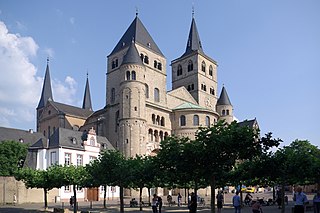
The Diocese of Trier, in English historically also known as Treves from French Trèves, is a Latin Church ecclesiastical territory or diocese of the Catholic church in Germany. When it was the archbishopric and Electorate of Trier, it was one of the most important states of the Holy Roman Empire, both as an ecclesiastical principality and as a diocese of the church. Unlike the other Rhenish dioceses—including Mainz and Cologne–Trier was the former Roman provincial capital of Augusta Treverorum. Given its status, Trier has continuously been an episcopal see since Roman times and is one of the oldest dioceses in all of Germany. The diocese was elevated to an archdiocese in the time of Charlemagne and was the metropolitan for the dioceses of Metz, Toul, and Verdun. After the victory of Napoleon Bonaparte of France, the archdiocese was lowered to a diocese and is now a suffragan in the ecclesiastical province of the Archdiocese of Cologne. The diocesan cathedral is the Cathedral of Saint Peter. The Cathedral Chapter retains the right to elect the bishop, rather than selection by papal appointment.
Ambrosius Pelargus was a German Dominican theologian. He was skilled in Latin, Greek, and Hebrew. His polemical efforts were directed principally against the Anabaptists, the Iconoclasts, and those who rejected the Mass.
Adolf III of Schauenburg (1511-1556) was the Archbishop-Elector of Cologne from 1547 to 1556.
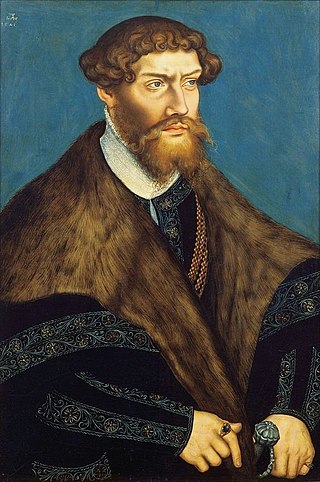
Philip I of Pomerania was Duke of Pomerania-Wolgast.
Philip III, Count of Nassau-Weilburg was a Count of the Nassau-Weilburg. Among his major achievements were the introduction of the Reformation, the foundation of the Gymnasium Philippinum in Weilburg and the start of the construction of Schloss Weilburg.
The following outline is provided as an overview of and topical guide to Protestantism:
Ascanio Parisani was an Italian Roman Catholic bishop and cardinal.
References
- 1 2
 One or more of the preceding sentences incorporates text from a publication now in the public domain : Zimmerman, Benedict (1907). "Eberhard Billick". In Herbermann, Charles (ed.). Catholic Encyclopedia . Vol. 2. New York: Robert Appleton Company.
One or more of the preceding sentences incorporates text from a publication now in the public domain : Zimmerman, Benedict (1907). "Eberhard Billick". In Herbermann, Charles (ed.). Catholic Encyclopedia . Vol. 2. New York: Robert Appleton Company.